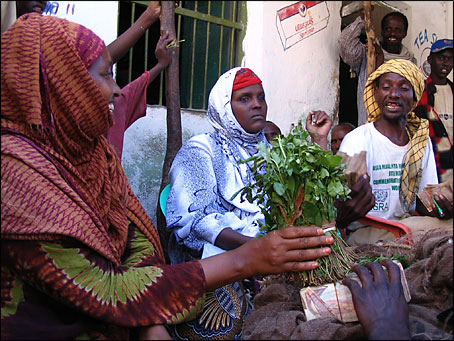 |
| Maryann Ali, left, a khat dealer in Wajid, was a teacher before the Somali government fell in 1991 and the schools were closed. Emily Wax |
In Nation Without a Government, Educated Women Play Dominant Role as Sellers of Widely Used Narcotic Plant
By Emily Wax Washington Post Foreign Service
Sunday, April 16, 2006; Page A11
WAJID, Somalia -- Before Somalia's government collapsed in 1991, Maryann Ali was an elementary school teacher who spent her days giving fifth-graders geography and math lessons. Now she earns a living dealing khat, a narcotic plant that when chewed yields a jittery high and feelings of invincibility that later melt and leave the user in a lethargic stupor.
Educated Somali women such as Ali dominate the khat trade, a profession that is both admired and scorned here, and that offers one of the few remaining job opportunities in the country's moribund economy.
 |
A 34-year-old khat user who says he loves the feeling khat gives him; it keeps him awake. Chewing khat can be socially acceptable in a country where drinking alcohol is not. (Emily Wax)
|
"If the country was ever normal, I'd quit and return to teaching," said Ali, 40, who guards her stash with an AK-47 and has a gold tooth that she says makes her appear "tough." "What else can I do to survive?"
Somalia, a country of more than 8 million ruled by warlords, has the highest percentage of khat users in the world, researchers say. Scarred by violence and raised in anarchy, a generation of young Somalis say King Khat, or miracle miraa, as the drug is known, helps ease the pain.
Researchers estimate that 75 percent of adult males use the drug. Every town has khat rooms, where men lounge for hours listening to blaring music and chewing wads of green leaves that ooze with saliva and stick between their teeth.
The consumption of alcohol and most drugs is socially unacceptable in this Muslim country, but chewing and dealing khat are considered gray areas. So Ali, a mother of 10, peddles the narcotic, which she said enables her to earn money and abide by the philosophy of Somalia's tight-knit clans: "Above all, provide and protect."
Khat is legal in much of sub-Saharan Africa and enjoyed throughout the Horn of Africa and in parts of the Middle East, especially in Yemen. It is illegal in several African countries, such as Tanzania and Eritrea, and in the United States and across Europe.
| Video |
The Great Escape
Qat, a plant grown in Yemen that causes a euphoric state in the consumer, plays a dominant role in celebrations, marriages and political meetings. Some men purchase fresh leaves of the plant each day, then join others in a qat session, where they chew the leaves and store them in their cheeks.
|
In 1980, the World Health Organization declared khat a highly addictive drug, and East African leaders have campaigned against it, saying chronic use leads to high divorce rates, wife beatings and job loss. In Somalia, opponents call the habit a national epidemic and say men who use the drug neglect their families by spending huge amounts of cash and time on it.
Khat crops have flourished in neighboring Kenya and Ethiopia, where farmers started uprooting their coffee plants and growing the leafy green plant when the world coffee market crashed in the 1990s and early 2000s. Today, Kenya exports about $250 million of khat annually, beating out tea as one of the county's most lucrative exports, according to the Kenyan government.
Dozens of flights leave Nairobi's two major airports every day, transporting burlap sacks filled with khat to Somalia in a trade that is worth about $300,000 a day, according to Kenya's National Agency for the Campaign Against Drug Abuse.
And like tobacco and alcohol, khat is a big business run by powerful people.
Warlords control the khat trade and use the proceeds to buy weapons, which allows them to maintain control of their warring fiefdoms, according to a 2003 report of the United Nations Panel of Experts on Somalia.
CONTINUED 1 2 Next > |

